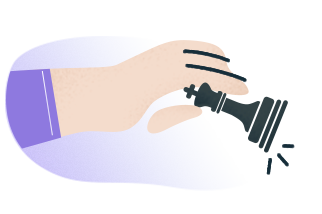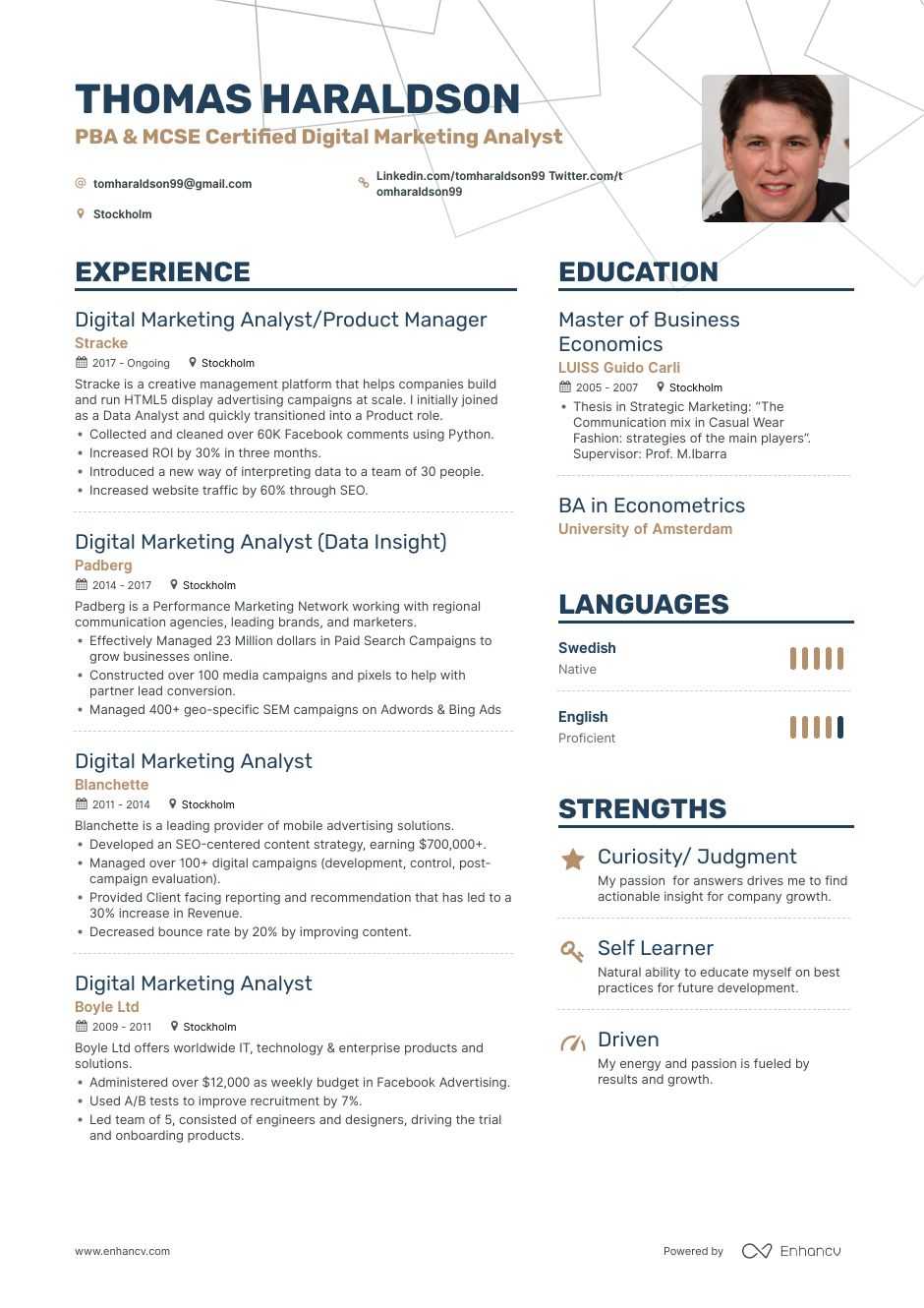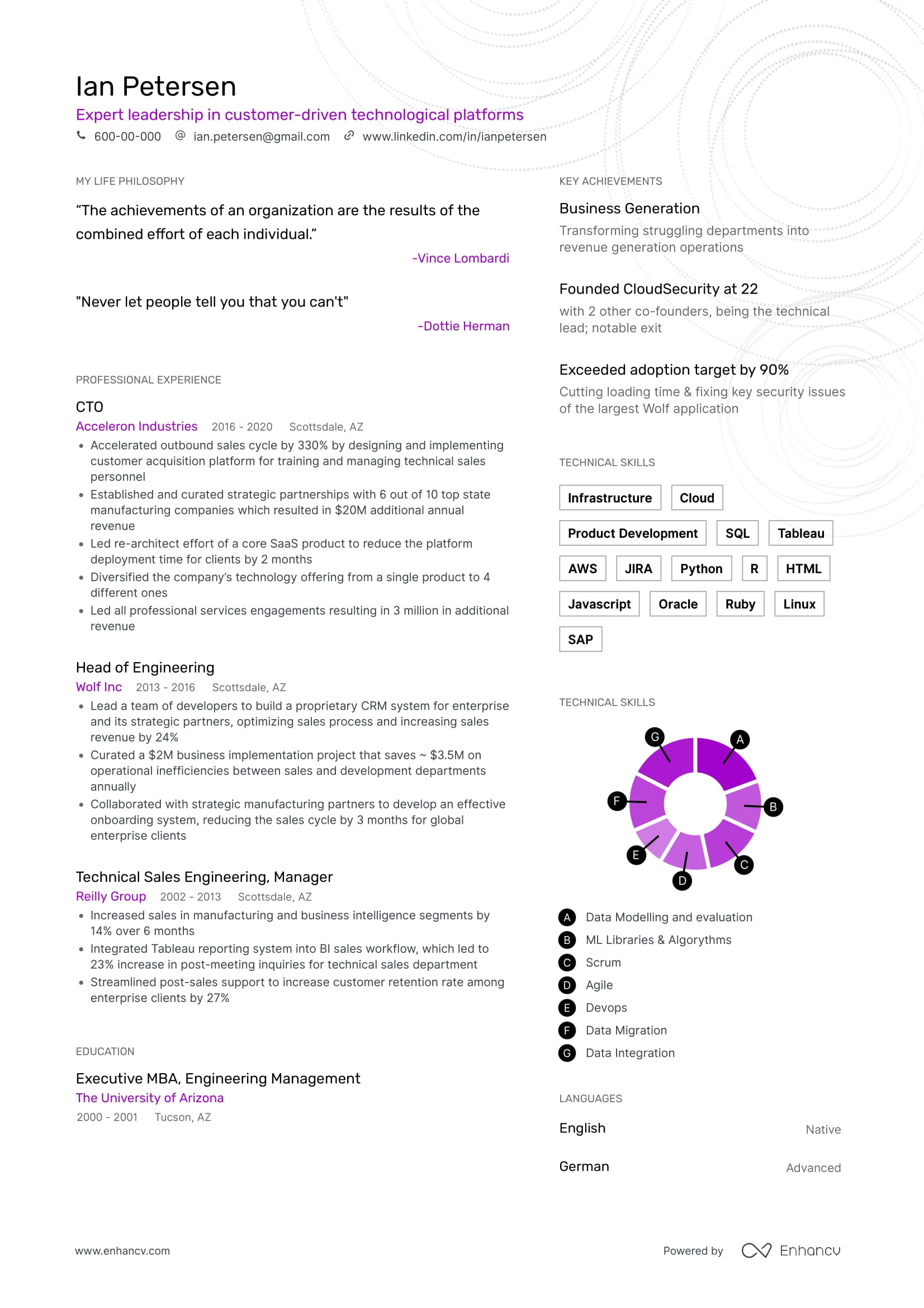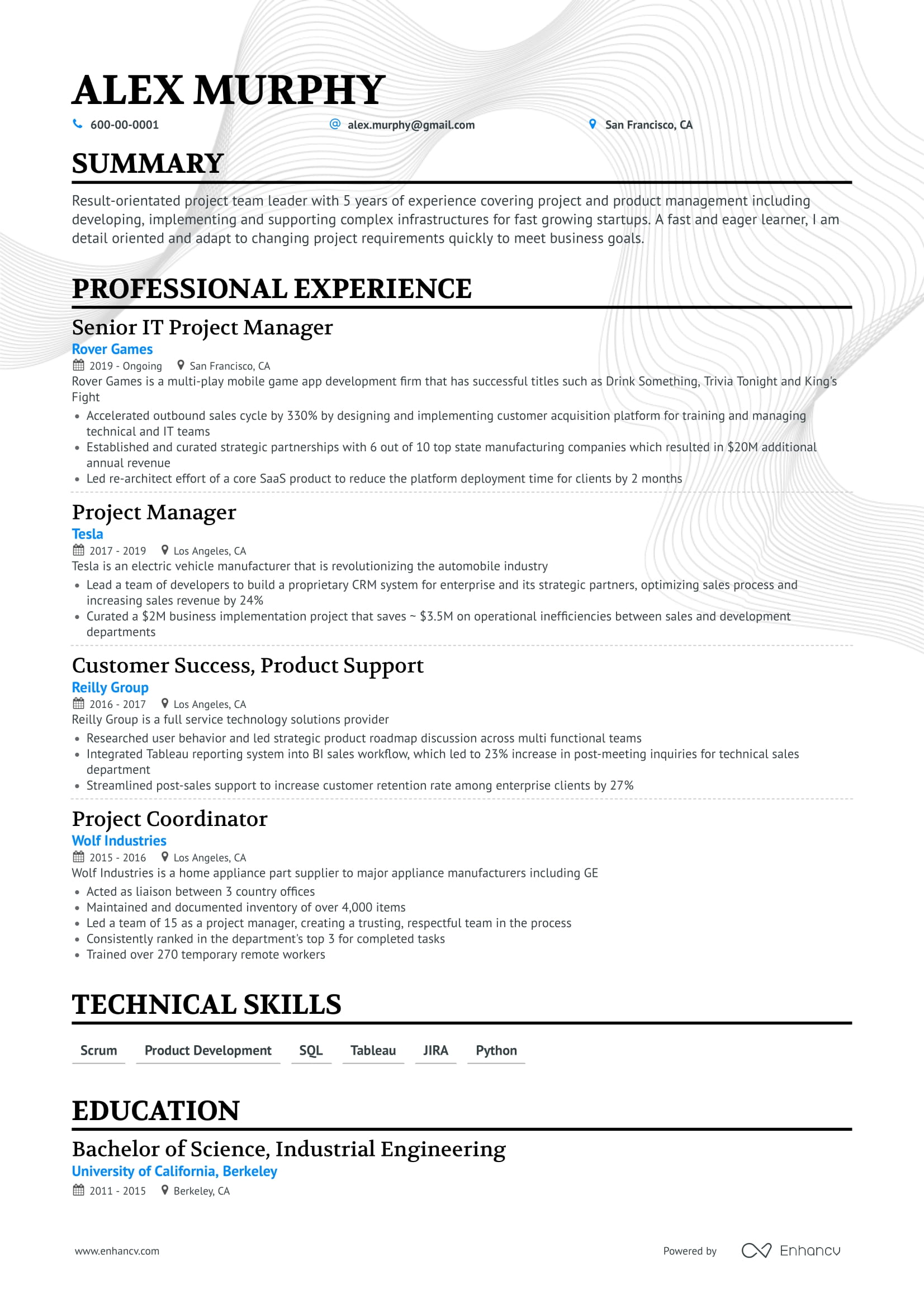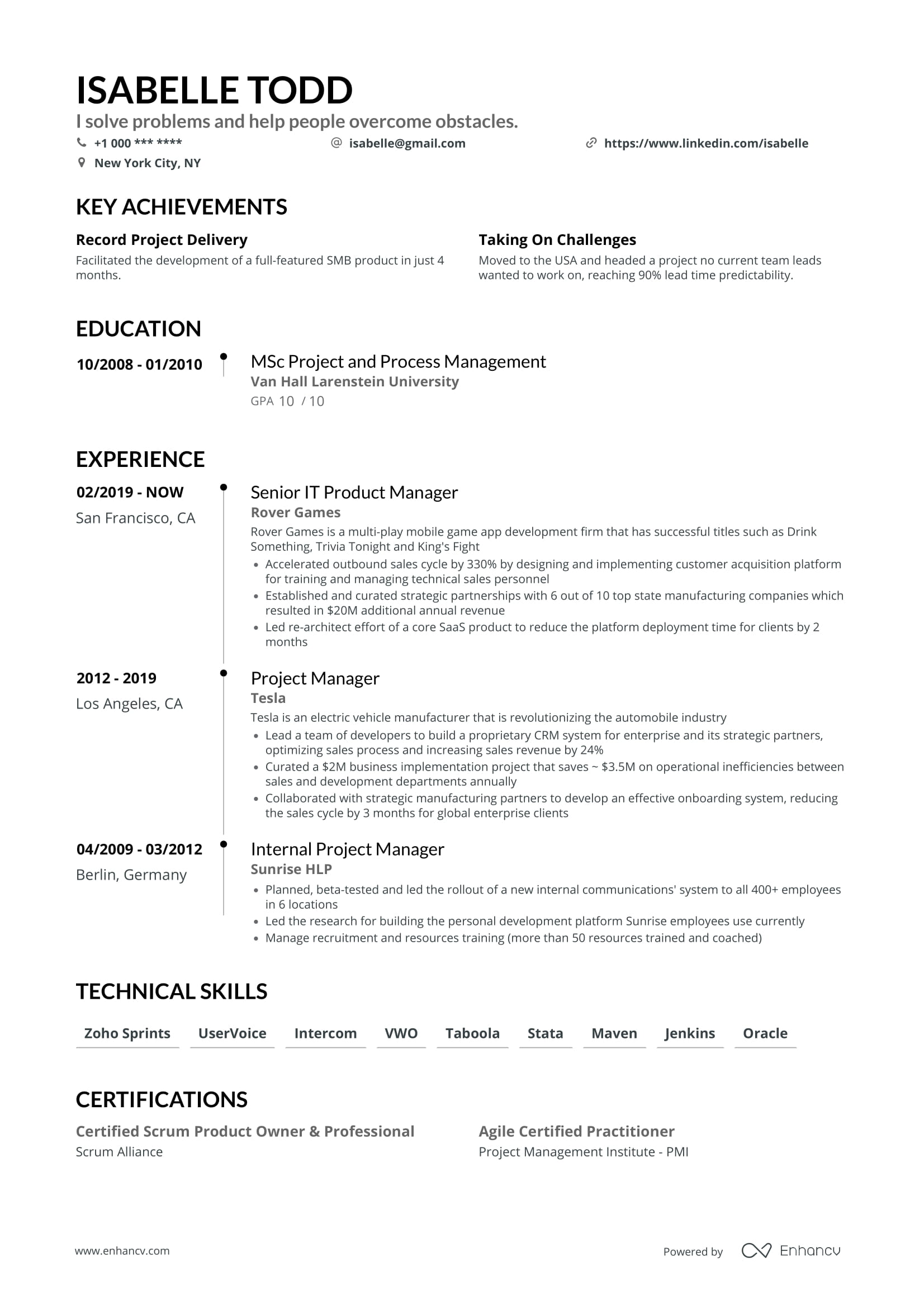Example Digital Marketing Analyst Resume - Browse more resume templates and build a stand-out resume
The days when digital marketing analysts were simple data collectors and crunchers are over.
Today, the requirements have changed substantially and if your digital marketing analyst resume doesn’t reflect that, you’re not getting hired.
Eric nailed it there.
Minimum expectation today is that digital marketing analysts be able to tell compelling stories with data. And sometimes, even take on elements of product management and business development roles.
All that is to say, you’ve got a lot to prove on your digital marketing analyst resume.
Let’s go through all the things you need to do to show that you’re not applying to be a data analyst in the early 2000s.
This digital marketing analyst resume guide will teach you:
✔ What people hiring digital marketing analysts look for in a resume
✔ How to make your header 10x more effective
✔ How to use your professional summary to show off a critical skill
✔ The best way to frame your work experience for maximum impact
✔ Which skills and certifications make a difference
Digital Marketing Analyst resume example
Looking for related resumes?
How to write your Digital Marketing Analyst resume
You are expected to be good with presenting data.
And, make sure you don't fail do it within your resume.
Your resume shouldn't like one of those skewed pie charts that Steve Jobs used to show. It should reflect the truth.
But at the same time, it should also highlight information based on priority.
And lastly, don't make your hiring manager "clean bad data" to see if you're relevant.
If you look closely, you'll notice three things that hiring managers want to see from your resume:
1. The type of experience you have: agency or in-house
2. Your specialization is within digital marketing
3. Results that you were able to achieve
We’ve found these 6 sections are best for conveying that information.
The top 6 digital marketing analyst resume sections
- A “data storytelling” professional summary
- Digital marketing analyst work experience
- Technical skills
- Soft skills
- Certifications
- Education
Your resume header is probably a missed opportunity
A basic resume header with your name, contact details, title, and location is fine. So what’s the problem?
It sends the wrong message.
One of the most valuable skills employers look for is proactiveness.
They want someone who is going to go above and beyond. And someone doing bare minimum isn't going to discover hidden treasures in data.
That’s why you need to take every opportunity to do more than the minimum.
Ironically, a resume header provides two key chances to do that. See if you can spot them in the differences between these examples:
What makes a difference is:
- Certifications
- Links
But why do these things help?
Both show that you do more than the minimum.
Certifications demonstrate that you develop skills and get certified for them.
Community links means that you’re proactive and involved.
Professional summary for a Digital Marketing Analyst resume
Many describe the role of a modern digital marketing analyst as a “data storyteller”.
Take a look at the resume summary below. It starts by characterizing their general attitude before giving a quick but effective overview of their professional experience.
In some cases, you might include some success metrics, but here those metrics are kept in the experience section, so this kind of summary is sufficient.
Now let’s see another version of that same summary:
It’s a summary alright, but it simply doesn’t convey the same sense of accomplishment and competence.
How to write a digital marketing analyst experience section
Your experience section has three main goals:
- Show what type of digital marketing analyst experience you have (agency or in-house).
- Show that you can deliver concrete results.
- Explain those two things in a compelling and understandable way (in other words, show you won’t put the head of marketing to sleep when presenting your work).
Avoid the common mistake of simply listing that you “used X tool, interpreted data, delivered presentations, etc.”
Now, have a look at a more typical experience section you’ll find on most digital marketing analyst resumes:
Taking that same experience and removing the numbers and the more detailed descriptions of what exactly you did turns experience into something you’d barely notice.
Do you need a degree to be a digital marketing analyst?
Education requirements vary widely for digital marketing analyst jobs. Many positions require a degree in marketing or business, though any degree related to statistics, economics, or business administration will be useful.
In many cases a strong background in marketing analytics will be sufficient, but a degree is absolutely a leg up.
All that said, if you have a degree, you should include it in an education section.
How should you decide which skills to include and emphasize?
We’ve discussed how expectations for digital marketing analysts will be different for agency or in-house roles, but there’s one essential skill that united them: taking data and telling a story.
Whether you’re great with HTML and Javascript or not, most marketing directors and hiring managers want to know that you can find insights in their data and turn those insights into action.
So avoid falling into the trap of simply listing lots of technical skills and thinking this will show you’re a great digital marketing analyst. Those skills are great to have, but alone they’re not enough.
5 Soft skills to include on a digital marketing analyst resume
- Presentation skills
- Data analysis
- Project management (depending on what type of digital marketing analyst role it is)
- Organization
- Strategic planning
12 Technical skills to include on a digital marketing analyst resume
- Google Analytics
- Google Tag Manager
- Data Studio
- R
- Predictive analytics
- Google Ads
- Facebook Ads
- Javascript
- HTML
- SEO
- DOM
- regex
How to include your certifications on your resume
Certifications allow you to show that you’re proactive in acquiring new skills and are a very efficient way to build credibility on a resume.
That’s because simply listing skills doesn’t tell a hiring manager very much. Certifications (alongside giving specific examples) is one of the best ways to show that you genuinely have a certain skill.
We’ve broken down key certifications based on those related to the data & analytics and the business analysis sides of digital marketing analysis.
Data & analytics certifications
- MapR Certified Data Analyst
- Microsoft Certified Solutions Expert (MCSE): Data Management and Analytics
- SAS Certified Data Scientist Using SAS 9
Business analysis certifications
- IREB Certified Professional for Requirements Engineering (CPRE)
- PMI-Professional in Business Analysis (PBA) Certification
- IIBA Entry Certificate in Business Analysis (ECBA)
- IIBA Certification of Competency in Business Analysis (CCBA)
- IIBA Agile Analysis Certification (AAC)
- IQBBA Certified Foundation Level Business Analyst (CFLBA)
- IIBA Certified Business Analysis Professional (CBAP)
Before you leave, let’s summarize what you’ve learned so far.
TLDR;
- Show you have experience in business development and strategy in addition to basic data analysis skills.
- Include professional links and certifications in your resume header.
- Use your professional summary to show you’re a “data storyteller”.
- Show you can get results and communicate them in your work experience.
- Finish with certifications and skills (with examples) to fill in any remaining gaps.
